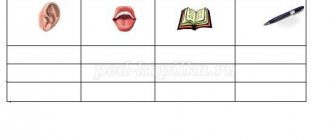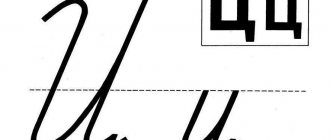Many parents ask this question - how long to study with a speech therapist?
It all depends on the type of speech disorder
Sound production in case of monomorphic dyslalia (in the absence of lesions of the central nervous system, intact innervation of the articulatory apparatus, hearing and with a normal medical history). In this case, one sound can be introduced quite quickly at least 2 months to automate and introduce it into speech There are cases when this can be done faster or slower, but this depends on the individual characteristics of the child, his character, the frequency of visits, daily homework, and the child’s health. With polymorphic dyslalia (in the absence of lesions of the central nervous system, preserved mobility of the articulatory apparatus, hearing and with a normal medical history), in which several groups of sounds are pronounced defectively. The classes will take more time, approximately 6 months, because... the pronunciation of many sounds is impaired, and it is necessary not only to place and automate them in speech, but also to teach how to differentiate them. For neurological disorders, depending on the nature of perinatal brain damage.
- For dysarthria, depending on its form, from one to 3 years;
- In cases of cerebral palsy in children, the degree of damage to gross, fine motor and articulatory motor skills is taken into account; on average, the work takes from 1 year or more.
- With alalia for about 3 years, sometimes more time is required.
- For stuttering from 6 months (with biofeedback apparatus) or more, depending on the type of stuttering, age, frequency of visits, diligence, concentration, self-regulation.
In case of organic lesions, caused by defects in the articulatory apparatus (bite, shape and size of the tongue, shape of the palate, lips, hyoid frenulum). Depending on the type of lesion, the duration of the course is selected individually, and in the process of speech correction, the content and duration of the course may change. It should be noted that in some cases, for example, with rhinolalia, surgical intervention is required and then the work on correcting speech becomes quite lengthy. In case of violations of the tempo of speech (bradylalia, tachylalia, batarism, polternium, stuttering). In these cases, for more efficient and faster work, we recommend taking speech correction courses using biofeedback and forbrain devices in addition to the main classes. The duration of classes can take from 6 months or longer. For dyslexia and dysgraphia. Depending on the type of dyslexia and dysgraphia, degree of neglect, medical history, desire of the child, daily homework for 2 years and more. VERY IMPORTANT! It should be noted that all terms for speech correction are written in an average value, each child is individual (his medical history, type of a particular disorder, character, psycho-emotional state, self-regulation, will), in some cases, parallel work with a psychologist, neuropsychologist is required , neurologist, defectologist, exercise therapy specialist, auxiliary devices DENAS, forbrain, biofeedback. Therefore, it is never possible to say exactly how many classes a particular child needs; we can only indicate approximate time frames for work. Also, parents and relatives of the child play a significant role in the work , doing homework every day, practicing correct sound pronunciation, lexical-grammatical and tempo-rhythmic aspects of speech in everyday speech, supporting and encouraging the child in his activities, creating a favorable and fruitful environment for child, “Example” is the correct speech of the parents themselves.
Author of the article: Anastasia Gauk.
How long
If a speech therapist in absentia, without seeing the child, stipulates clear deadlines for solving the problem, you should be wary. No matter how much you would like to estimate the time costs, it is impossible to do this without meeting with the child. The duration of a session with a speech therapist for children depends on the age of the child, the complexity of the situation, the presence of neurological diagnoses and the willingness of parents to carry out the tasks of the speech therapist at home. The specialist will be able to name a specific work plan and approximate time frame after the first or even third lesson.
It happens that sibilants or [r] can be performed in just a couple of lessons, but after that they need to be brought to automaticity. If you constantly work with your child at home: correct him if he pronounces it incorrectly, perform articulation exercises, repeat simple speeches, then you can continue to do without a speech therapist. However, many parents resort to the help of a specialist. This is understandable: this requires a lot of free time and experience in teaching a child. With a speech therapist, a healthy preschooler can automate sounds in two to three months. In this case, classes with a speech therapist for children should take place at least twice a week.
Let's teach you to speak beautifully and correctly - try a free lesson with a tutor
If a child does not distinguish when they say “barrel” and when they say “kidney,” he has problems with phonemic hearing. Such difficulties affect oral speech and interfere with writing correctly. Teaching to hear correctly is not easy; such work can last the entire school year. The more sounds that cause difficulty, the more time it takes.
Tomatis® Method - Soundsory® in Troitsk Moscow
Improving cognitive and movement...
Speech correction Speech therapist in Troitsk Speech therapy center Speech therapy General development 0 Liked Share
When to expect results
If the child does not have problems with the articulatory apparatus or serious diagnoses, you will notice changes in the pronunciation of sounds within 4-8 lessons. At the same time, the speech therapist must explain what he sees as the main obstacle. This way you will understand how you will overcome it. If a healthy child does not develop new sounds within two months, even during speech therapy sessions, it is worth seeking advice from another speech pathologist-defectologist. However, even if sounds appear, full automation should not be expected earlier than after two months of operation.
When a child has difficulty perceiving speech by ear and confuses sounds, the results will be noticeable within two to three months. The speech therapist should explain what he focuses on first and foremost and what will be a sign of success in learning. In order not to waste money and time, it is worth undergoing preliminary diagnostics from several specialists. If they all describe the cause of the difficulties in the same way, try to understand how they offer to help the child, what their program of work is.
People also turn to a speech therapist to develop attention, memory, logical thinking, and oral speech. In this case, progress will be noticeable in everyday situations: in the child’s reasoning and statements at home. If a speech therapist assigns homework in a special notebook, you will see how it gradually becomes more difficult. First you will need to remember a simple rhyme, find a few differences or similarities in the picture. Over time, the child will be able to memorize and recite increasingly longer poems and speak in common sentences.
Start working with a speech therapist for free
How does speech develop?
Indeed, the development of speech in childhood is highly variable, that is, the speech skills of one child can be very different from the speech of other children. How to distinguish individuality from delay, variation from speech disorder? The basic principle is as follows: the development of speech involves its constant improvement.
Up to 1 year
Up to a year, it is best to rely on the child’s progress from screaming to communicating with sounds, syllables, and words. That is, at first the child screams, then the scream gradually develops into humming in the process of communication, then into babbling, and then into the first words.
If this development does not occur, the child lingers at one stage for a long time, and new units (syllables, words) are not formed in any way, it is worth seeking professional advice.
An important indicator at this stage is the desire for communication. If the child does not communicate or does it completely differently than the mother expects, it is better to consult a specialist. During this period, we do not yet look at the sound pronunciation and correct pronunciation of all words.
After 1 year
After a child reaches the age of 1 year, his understanding of speech begins to rapidly develop. So rapidly that it can even supplant the development of an active vocabulary. In other words, the first words that appear remain and are used, and there are quite a few new words.
If at this moment your child turns into a real home “spy” and begins to understand more and more complex phrases and stories from you, most likely everything is in order. You can play “repeat” and try to get your child to say a few more words by imitation.
At the same time, the child’s vocabulary is slowly but surely expanding, and closer to the age of one and a half years, a real vocabulary explosion can occur (in science it is called a lexical explosion). And if parents at first diligently evoked new words, now they sometimes have a desire for fewer words, development can proceed so quickly.
If speech understanding does not develop or develops very slowly, you should not postpone the consultation. The situation is similar with the appearance of words - if a child, after one and a half years, uses only those words that he began to speak at one year old, seeking professional help will not be superfluous.
How and what the baby says
There is a small nuance in how a child pronounces words during the period of lexical explosion - the more words appear in the child’s vocabulary, the more the baby can shorten and distort them. At the beginning of the lexical explosion, this is understandable and explainable, but then the child must develop the ability to observe the speech of others and the complication of words - from a monosyllabic word it turns into a two-syllable and even a three-syllable one. If the process of complicating the syllable structure is underway, this is a good sign.
2 years
By the age of 2, we expect (in a conditional norm) to receive a phrase. A phrase is not just “you de” or “I am going to die.” The phrase assumes the child’s ability to connect two (then or more) available words in order to describe a fragment of reality more complex than just an object: “Tis am” - the cat is eating, “Pa pat” - Dad is sleeping, “Natya tuki” - Nastya wants to be held in her arms . As you can see, the phrase does not yet look like a completely understandable sentence. And yet, if “I’m going to sleep,” “I’m going to go down,” “I’m going to go down” exist in speech, then the child has formed a two-word phrase.
Then the words begin to change - grammatical forms appear: “I’m spitting” - I’m sleeping, “there are tanks” - there are dogs.
Moreover, at this moment the child says many word forms incorrectly: “houses”, “eggs” - the child formulates a scheme for forming the plural and transfers it to all other words. At the very beginning this is very good. But then it should give way to more generally accepted options based on observation of other people’s speech and parental prompts. The syllable structure also continues to become more complex - at this stage the child can pronounce words of three and four syllables.
To identify signs of speech delay and impairment, we focus on development. The reason for contacting a speech therapist may be a delay in the appearance of a phrase, the absence of the first word forms and their gradual development, or the lack of complication of the syllabic structure.
2–3 years
In the age period of 2–3 years, speech should become a regulator of the child’s behavior. The vocabulary is expanding - it includes nouns, adjectives, and verbs. Grammatical forms become more complex, the syllable structure becomes more complex, the child understands more and more complex fairy tales and stories, and tells you if you are distracted and stopped reading or telling.
There is no point in listing all the word forms that appear during this period; let’s name the basic skills:
- the use of singular and plural forms (in the variants “eggs”, “trees” and others formed not according to simple rules, the child has the right to make mistakes);
- the use of masculine, feminine and neuter endings in nouns, verbs and adjectives;
- understanding and using basic prepositions.
The order in which skills appear is not so important; constant development is important.
Or maybe it will go away on its own?
If a child lags behind his peers in some way, this is not a cause for concern. Children develop unevenly: sometimes they accumulate experiences and impressions in order to then make a breakthrough. So one child already speaks in phrases, and the other only in words. One immediately began to clearly “growl”, and the other pronounced words in the French manner. One understands that cucumber and tomato are vegetables, while the other does not know how to generalize the concepts. To assess the level of speech development of children, psychologists and teachers have developed special manuals.
Instead of comparing your child to others, offer tests one to two months apart. If your son or daughter's abilities improve over time, everything is probably fine. If it seems to you that the child is standing still, seek advice. When a child distorts sounds or makes grammatical errors: for example, “grandmother went to the store,” he should be shown to a speech therapist. The sooner a specialist begins to observe a child, the greater the chance of successful speech correction. A speech therapist does not always offer classes; he may refer you for a consultation with a neurologist or neuropsychologist. At Tetrica you will receive your first consultation with a speech therapist for free. Fill out the form and come meet us!
Recommended age to visit a specialist
A speech therapist is a specialist who eliminates speech defects. People turn to him for various reasons. Sometimes this is not pronouncing a sound, in other cases it is a long silence of the baby. The age at which a child needs a speech therapist depends on the specific problem.
The main cause for concern is the lack of speech. Normally, children begin to speak at one year of age. Don't worry if the words appear a little later. Experts consider the critical age to be two and a half years. If by the age of 2.5 years the baby has not spoken or has only a few words in his speech, then there is a delay in speech development. A comprehensive examination by specialists is recommended here.
If you have questions about the speech of a child under 2 years old, or you doubt his correct development, then it makes sense to go to a pediatrician. The speech therapist accepts children from the age of 2 years.
Many people do not think about at what age they should contact a speech therapist with their child, believing that speech will develop on its own. That in kindergarten or school teachers will correct all problems. Then the child is asked to leave a private kindergarten due to problems with speech development or is left for the second year at school. There is a practice of such cases and they are not isolated.
The speech therapist conducts a speech therapy examination, which resembles a comprehensive testing of the child’s abilities. He checks whether the child understands speech, whether the child follows simple instructions, how many words are in his speech, whether he knows how to change words by numbers, etc. A speech therapist is a correctional teacher. He conducts special classes that are aimed at evoking and developing the baby’s speech. This slow process sometimes takes several years.
The parent has many reasons for concern, including the absence of humming or babbling, the baby’s lack of understanding of spoken speech, and delayed physical development. This may be a symptom of serious problems. Therefore, consultation with various specialists, not just a speech therapist, will be required. Before taking the child to a speech therapist, parents can show him to a psychiatrist, audiologist (to rule out hearing impairment), or a neurologist.





